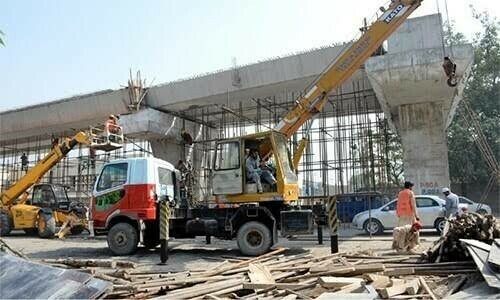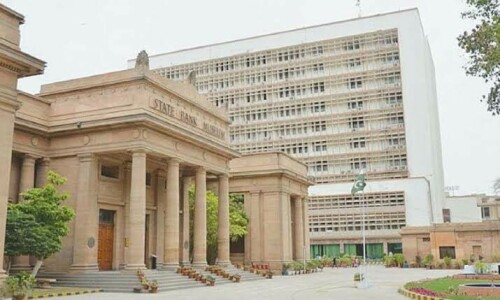• Denies ‘planned’ departure from country
• UN envoy tells Jolani Syria must have ‘credible’ transition
• EU sending top diplomat to talk to new leaders
DAMASCUS: Ousted president Bashar al-Assad broke his silence on Monday after fleeing Syria, saying in a statement that he only left once Damascus had fallen and denounced the country’s new leaders as “terrorists”.
Assad fled to Russia just over a week ago, as a lightning offensive spearheaded by the Islamist Hayat Tahrir al-Sham (HTS) wrested from his control city after city until the rebels reached the Syrian capital.
The collapse of Assad’s rule stunned the world and sparked celebrations around Syria and beyond, after his crackdown on democracy protests in 2011 sparked one of the deadliest wars of the century.
“My departure from Syria was neither planned nor did it occur during the final hours of the battles,” said a statement on the ousted presidency’s Telegram channel.
“Moscow requested... an immediate evacuation to Russia on the evening of Sunday December 8” after he moved that day to Latakia, where Russia operates a naval base, the statement said.
“When the state falls into the hands of terrorism and the ability to make a meaningful contribution is lost, any position becomes void of purpose,” added the statement, released in English.
Assad’s fall sparked rejoicing in Syria and around the world after five decades of rule by his clan, which had zero tolerance for dissent and which operated a complex web of prisons to detain anyone even suspected of dissent.
‘We want our children’
To the victims of some of Assad’s worst atrocities, the end of his era brought a glimmer of hope that they might find closure.
As HTS and its allies advanced through Syria, they opened prison gates to free people suspected of dissent who had been held for days, months, years and even decades.
“We want our children, alive, dead, burned, ashes, buried in mass graves...just tell us,” Ayoush Hassan, 66, told AFP at Saydnaya, one of the prisons Assad had used to strike fear into Syrian society.
She travelled to the prison in Damascus from her home in northern Syria, but could find no trace of her missing son.
According to the Syrian Observatory for Human Rights, more than 100,000 people died in Syria’s jails and detention centres from 2011.
Ghazi Mohammed al-Mohammed, a survivor of detention, told AFP that officers seized him while he was on a trip to Damascus, took away his papers and said to him: “Now you’re number 3006.” He does not even know why he was arrested.
“Towards the end I just wanted to die, waiting for when they would execute us. I was almost happy, as it would mean my suffering was over,” he said.
‘We can’t leave a vacuum’
Governments around the world have welcomed the downfall of Assad, who came under sanctions over the abuses committed under his authority.
EU foreign policy chief Kaja Kallas said on Monday the bloc’s envoy to Syria would travel to Damascus to make contacts, adding: “We can’t leave a vacuum.” On whether HTS could be trusted, she was cautious.
The UN envoy to Syria, Geir Pedersen, told HTS leader Abu Mohammed al-Jolani Syria must have a “credible and inclusive” transition, according to a statement on Monday.
Qatar’s embassy is set to resume operations on Tuesday after Turkiye, a key backer of some of the rebel groups that ousted Assad, reopened its embassy.
Britain and the United States confirmed they were in touch with HTS, despite officially considering the organisation a “terrorist” group.
A French diplomatic team is due in Damascus on Tuesday to “retake possession of our real estate” and make “initial contact” with the new authorities, acting Foreign Minister Jean-Noel Barrot said.
Ukrainian President Volodymyr Zelensky said his country was coordinating on providing aid including wheat, flour and oil to Syria. Ukraine has been at war since Russia invaded in 2022.
Published in Dawn, December 17th, 2024














































Dear visitor, the comments section is undergoing an overhaul and will return soon.